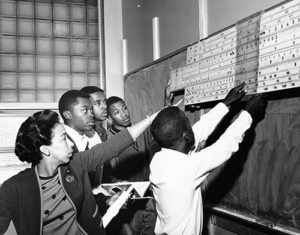Study will inform plans to make HBCU special collections
and archival materials discoverable and accessible
The HBCU Library Alliance and the Council on Library and Information Resources (CLIR) have received a $75,000 planning grant from The Andrew W. Mellon Foundation for a project titled “Creating Access to HBCU Library Alliance Archives: Needs, Capacity, and Technical Planning.” The project will identify common barriers and shared visions for creating access to historic collections held by libraries at Historically Black Colleges and Universities (HBCUs).

The rare and unique collections in the care of HBCUs, from historic documents to photographic prints and audiovisual media, contain a wealth of information about African American history, culture, and lives. However, many of these materials remain inaccessible. The project will enable the HBCU Library Alliance to envision how its 76 member institutions will work together to preserve, describe, and digitize the unique collections they steward.
“This project is a critical step to enable the discovery of previously ‘hidden’ primary resources at HBCUs that will enrich and broaden the existing body of knowledge about the African American experience,” said HBCU Library Alliance Executive Director Sandra Phoenix. “These archival collections will inform the scholarship produced by students, faculty, and other researchers, strengthening the accuracy and authenticity of the historical accounts about a resilient and accomplished race of people. The HBCU Library Alliance is so pleased to collaborate with CLIR to implement this exciting project.”
Guided by Phoenix and members of the HBCU Library Alliance Board of Directors, the project team will gather input from HBCU library leaders and staff about the ways rare and unique materials in their libraries are currently managed, how they are used, and how they imagine creating access to HBCU collections in the future.
“The funding for this project could not have come at a better time,” writes Monika Rhue, HBCU Library Alliance Board chair. “Our HBCU libraries serve as the keepers of some of the most unique materials which tell the stories of the history of the African American experience in our country. Due to the racial and social unrest of this year, it is even more critical to preserve these collections and find ways to increase access. The content and depth of these collections will create limitless opportunities for us to learn from the events of the past and prepare for a better future.”
CLIR President Charles Henry underlines the significance of the project: “Creating access to the archives of HBCU libraries is both timely and urgent. Making collections that center Black lives and histories widely available to all will enable us to fill gaps in both personal and public histories. CLIR remains committed to amplifying the voices of people whose stories have not yet been widely heard because of a lack of sufficient access, and we stand to learn valuable lessons from the HBCU library leaders and staff who will manage and contribute to this planning effort.”
The HBCU Library Alliance is a consortium that supports the collaboration of information professionals dedicated to providing an array of resources to strengthen Historically Black Colleges and Universities (HBCUs) and their constituents. As the voice of advocacy for member institutions, the HBCU Library Alliance is uniquely designed to transform and strengthen its membership by developing library leaders, helping to curate, preserve and disseminate relevant digital collections, and engaging in strategic planning for the future.
CLIR is an independent, nonprofit organization that forges strategies to enhance research, teaching, and learning environments in collaboration with libraries, cultural institutions, and communities of higher learning. In pursuing its mission, CLIR is committed to capitalizing on strategic opportunities, building trust, and cultivating effective leadership.

